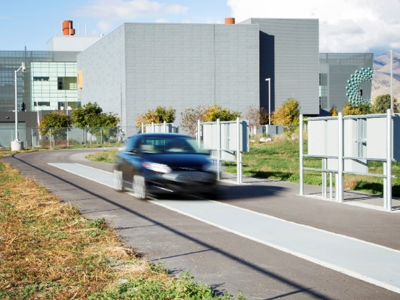Electric Vehicle Wireless Power Transfer
Wireless power transfer for electric vehicles is a patented technology commercialized through Advancing Sustainability through Powered Infrastructure Roadway Electrification. Passing over an electrified portion of the road, an electric vehicle’s batteries can charge as it moves. Wireless vehicle charging has already been implemented into public transportation; the potential to expand its use by commercial and personal vehicles is growing fast.
Problem
With an increasing number of electric vehicles on the road- passenger cars, buses and commercial trucks- USU researchers are developing technology to charge those vehicles while they drive, rather than having to park and usually plug to recharge.
Solution
The wireless power transfer technology developed at Utah State charges an electric vehicle’s batteries as it moves. While passing over an electrified portion of the road, power is transferred from a series of induction coils buried in the road to one or more induction coil in the electric vehicle. USU researchers are concentrating on the topology of the coils, the electronics needed to run the system, the charging infrastructure, interaction with the energy grid and related issues.
Benefits
Wireless power transfer can be applied to both light and heavy duty electric vehicles, improving the accessibility of clean, sustainable transportation. Commercial availability could replace gasoline and diesel systems in container handlers at shipping docks and distribution centers, while a nationwide electrified road network would allow people to drive their electric cars from coast to coast without recharging.
Applications
From city-wide public transportation to a nationwide network of electrified roads, electric vehicles and machinery can charge without stopping or plugging in.

Contact
Questions about this technology including licensing availability can be directed to:
Alan Edwards, MA, JD
Manager, Technology Transfer Services
(435) 797-2328 alan.edwards@usu.edu
Inventors
Regan Zane, Ph.D. and Zeljko Pantic, Ph.D.
Dept. of Electrical and Computer Engineering
Power Electronics Laboratory
Development Stage
Varies depending on type of implementation.
Patent Status
Patents granted and applied for.

